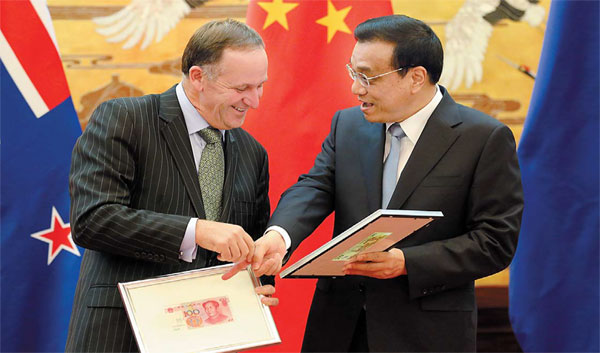What's news

| Premier Li Keqiang and New Zealand Prime Minister John Key exchange sample banknotes at a ceremony in the Great Hall of the People in Beijing on March 18. They announced that the two countries have approved direct trading of their currencies. Wu Zhiyi / China Daily |
Direct currency trading begins
China and New Zealand announced a landmark deal on March 18 that allows the direct trading of the two countries' currencies.
The deal, which takes effect on March 19, ends the need for companies and currency traders to convert Chinese yuan or New Zealand dollars into a third currency, usually US dollars, when making or receiving payments.
The move will cut the costs of conversion while boosting cooperation in trade and finance, Premier Li Keqiang said during a meeting with New Zealand Prime Minister John Key.
Li called for New Zealand to continue supporting China's financial organizations as they set up branches there and recommended that its enterprises use Chinese currency.
The agreement will make doing business with China easier, Key said, adding that New Zealand looks at the deal as an opportunity to expand cooperation with China in a variety of fields including trade, finance, education and tourism.
New US envoy hitsground running

Avid runner Max Baucus set himself an energetic target when he made his debut as US ambassador to China in Beijing on March 18.
"The Chinese philosopher Laozi famously said a journey of 1,000 miles begins with a single step," Baucus said at a news conference.
The envoy said he will follow this advice and promised to "get out of the office, out of Beijing and travel around China as much as possible".
"The ambitious goal is to travel and visit every province and region in China."
The 72-year-old envoy, who has a wealth of experience in dealing with China, spoke of three goals.
These are to strengthen economic relations between the world's two largest economies, cooperate with China on common global challenges and deepen ties between the people of the two countries.
Alibaba opts for IPO in US
Internet giant Alibaba Group's decision to seek a listing in the United States will help rekindle global investors' confidence in Chinese companies, experts said.
China's top e-commerce company confirmed on March 16 that it will start the long-awaited initial public offering procedure.
The proposed IPO marks the latest wave of Chinese companies flocking to the US, drawn by surging valuations for tech startups and optimism over Chinese stocks, said Hong Bo, founder of IT consultancy company IT5.
Experts urge banon tobacco ads
Public health and legal experts are urging that a comprehensive ban on tobacco-related advertising and promotion be included in an amended law aimed at curbing smoking, particularly among youths.
Public comment on the law has begun online and will continue until March 24, the State Council's legislative affairs website said.
"Compared with the current version, it has been improved, but it still lags behind the World Health Organization's standards," said Xu Guihua, deputy director of the Chinese Association on Tobacco Control.
Advertising is a critically important issue because it is known to increase tobacco use, particularly among young people, Xu said, which is why the WHO has taken a hard line.
Judicial reformersweigh their options
With expectations that the central government will soon issue its long-awaited outline of broad judicial reforms, deputies at the National People's Congress in Beijing tried to pinpoint what measures to take to implement the plan.
In November, the 18th Central Committee of the Communist Party of China discussed the key areas of judicial reform it wanted to tackle at the third plenary session, including making prosecutors more responsible for their cases, imposing harsher punishments for prosecutors or courts that break the law and creating a unified system to manage court employees.
Textiles fuel push for jobs in Xinjiang
The Xinjiang Uygur autonomous region plans to develop the textile industry vigorously this year to create more jobs and help maintain stability, according to local officials.
A plan has been drafted to expand the industry to raise employment capacity to 1 million people by 2020 from the current 200,000. More than 52 percent of China's commercial cotton is harvested in Xinjiang.
"Textiles is a labor-intensive industry with a long production chain. The best option is to create a large number of jobs in southern Xinjiang," said Liang Yong, deputy director of the region's Commission of Economy and Informatization.
A top leader has also said that developing labor-intensive industry should be given prominence because it could help to solve the employment situation in southern Xinjiang.
There is also the need to maintain social stability in Xinjiang, said Yu Zhengsheng, China's top political adviser.
Daily trading band widened
The People's Bank of China announced it would widen the daily trading band for the yuan against the US dollar to 2 percent from the official midpoint effective from March 17.
Until then the exchange rate of the yuan against the dollar had been allowed to rise or fall by 1 percent above or below the official midpoint rate on any trading day.
"Widening the floating range of the yuan exchange rate will help deliver efficient capital allocation and accelerate economic restructuring," said a spokesman for the PBOC, the nation's central bank.
"Generally speaking, the 2 percent adjustment is appropriate and will cause relatively low risks."
However, if the yuan exchange rate fluctuates abnormally, the bank will take necessary regulatory measures to maintain its normal trajectory, he said.
China Daily-Xinhua
(China Daily European Weekly 03/21/2014 page2)
Today's Top News
- Takaichi must stop rubbing salt in wounds, retract Taiwan remarks
- Millions vie for civil service jobs
- Chinese landmark trade corridor handles over 5m TEUs
- China holds first national civil service exam since raising eligibility age cap
- Xi's article on CPC self-reform to be published
- Xi stresses improving long-term mechanisms for cyberspace governance































